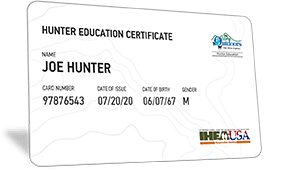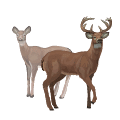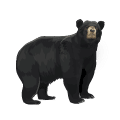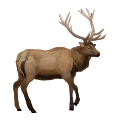
AGE REQUIREMENTS FOR OREGON HUNTERS
Every hunter in Oregon who is less than 18 years of age, is required to complete Hunter Education Certification. There is no minimum age to get certified.

OREGON HUNTING EDUCATION REQUIREMENTS
WHAT IS AN OREGON HUNTER EDUCATION CERTIFICATE
An Oregon Hunter Education Certificate proves that you’ve obtained the knowledge needed to hunt safely, responsibly, and ethically, within the state of Oregon. All hunters in Oregon who are less than 18 years of age are required to get certified.
WHERE CAN I GET MY OREGON HUNTER EDUCATION CERTIFICATE?
You can obtain your Oregon Hunter Education Card by completing an Oregon Department of Fish and Wildlife-approved course. Courses can be taken either by completing an in-person course or an online course in combination with a field day.
In-Person Course Option
Classroom courses typically take about 14-16 hours to complete, and take place over multiple sessions, including a live-fire exercise. Once the course and final exam are successfully completed, the student will be issued their Hunter Education Certificate.
Online Course + Field Day:
Hunters may also choose to complete hunter education certification by completing an online course in combination with a field day. Upon completing the online portion of the course, the student will be issued a voucher which grants them access to the field day course. Once the field day course and final test are successfully complete, the student will be issued their Hunter Education Certificate.
HOW OLD DO I HAVE TO BE TO GET A HUNTER EDUCATION CERTIFICATE IN OREGON?
There is no minimum age to complete a hunter education course and obtain a Hunter Education Certificate in Oregon.
MENTORED YOUTH HUNTER PROGRAMS
Oregon’s mentored youth hunting program is available for youth who are 9-15 years of age. The hunter must be 9 years of age at the time of enrolment, and will no longer be eligible to participate in the program once they turn 16.
The youth hunter is not required to possess hunter education certification to participate in the program however, they must be supervised at all times while hunting by an adult who is 21 years of age or older and has a valid license and tag(s) for the species being hunted.
The youth must register annually in order to participate in the program and carry proof of program registration while hunting.
Is my Oregon Hunter Education Certificate valid in other states?
The Oregon Hunter Education Certificate will be accepted in any US state, province, or country which also requires mandatory hunter education, meaning hunters who have obtained their Oregon Hunter Education Certificate may use it to hunt in other states. This is known as “reciprocity”.
What's the difference between a Hunter Education Certificate and a Hunting License?
A Hunter Education Card proves that you’ve obtained the knowledge you need to hunt safely and ethically in Oregon, and is different from a Hunting License. The Hunting Licence is similar to a permit, and is required to hunt any game animal within the state. Different licenses and permits may be required depending on which game animal is being hunted.

HUNTING LICENSES, STAMPS, AND PERMITS
HUNTING LICENSES
A Hunting License is required in the state of Oregon to hunt any game animal. There are a variety of license types available depending on your age, residency status, and what type of game you plan to hunt. Some of the hunting license types in Oregon include:
Big Game Licenses and Tags
There are a variety of big game license types available. The type of license required will depend on the type of game animal you plan to hunt. Some of the big game license types available include annual licenses and combination licenses, in addition to game animal-specific tags such as bear, cougar, deer, elk, and bighorn sheep tags, among others. Hunters are responsible for ensuring that they possess the proper licenses and tags for the game animal they plan to hunt. Big-game license fees may vary depending on the hunter’s residency status.
Youth Licenses
There are a variety of types of youth hunting licenses available including annual hunting licenses, big game licenses, and game bird licenses, in addition to game animal-specific tags such as bear, cougar, deer, elk, and bighorn sheep tags, among others. Hunters are responsible for ensuring that they possess the proper licenses and tags for the game animal they plan to hunt.
Sports Pac
Sports pacs offer outdoorsman a variety of hunting and angling privileges including fishing, shellfish, and hunting licenses. They sports pac include a combined angling tag, spring turkey, cougar, general or controlled bear tag, elk, and deer tags in addition to upland bird and waterfowl validations. They’re a popular option for hunters and anglers who participate frequently in both sports and would benefit from obtaining a variety of license and tags types with a single purchase.
OREGON HUNTER CERTIFICATION AGE REQUIREMENTS

Less than 18 years of age
All hunters in Oregon who are less than 18 years of age are required to complete a hunter education certification course and obtain a Hunter Education Certificate in order to legally hunt within the state of Oregon.

Oregon's Hunting Fines

Hunting License Violations
Up to $2000

Hunting with a motorized vehicle
Up to $2000

Unlawful taking of wildlife
Up to $250,000

Bag limit Violations
Up to $6,250

Obstructing the taking of wildlife
Up to $6,250
OREGON HUNTING FAQS
DO I NEED A HUNTING LICENSE TO HUNT WITHIN THE STATE OF OREGON?
Yes. A Hunting License is different from a Hunter Education Certificate and is required for any person who hunts any game animal within the state. This includes both residents and non-residents. Varying licenses must be purchased and carried depending on the hunter’s age, residency, and the type of game being hunted. Certain exceptions may apply depending on the game animal being hunted. For more information on Oregon, hunting licenses visit the Oregon Department of Fish and Wildlife website.
WHAT ARE THE OREGON HARVEST REPORTING REQUIREMENTS?
Any hunter in Oregon who has purchased a deer, elk, cougar, bear, pronghorn or turkey tag is required to report their harvest. In addition a survey must be completed for the tag purchase if the holder didn’t hunt or was not successful.
Hunters who purchased a sport pac are not required to report on tags that were not issued to them.
Hunters who fail to report deer and elk tags by the reporting deadline will be issued a $25 fine.
How to report a harvest:
The easiest way to report your harvest is online on the MyODWF website. However, hunters may also choose to report their harvest in person at an ODFW office or by telephone by calling 1-866-847-6339. For more information on harvest reporting visit the MyODFW website.
WHAT ARE THE HUNTER ORANGE REQUIREMENTS IN OREGON?
Rifle and upland game hunters who are under 17 years of age are required to wear a blaze orange vest or hat however, hunter orange is recommended for all hunters.
WHAT ARE THE BAG LIMITS IN OREGON?
Bag limits are imposed on hunters to restrict the number of a particular game animal that can be taken. Bag limits may be daily or seasonal depending on the type of animal. For example, daily bag limits may be imposed which restrict the number of a particular game species which may be taken per hunting day, while seasonal bag limits restrict the number of a particular game animal that may be taken by a hunter within the hunting season.
Bag limits may vary annually depending on game species populations. Hunters must understand and follow bag limit restrictions. Violations may result in fines. For more information on bag limits visit the Oregon Department of Fish and Wildlife website.

GAME AND NON-GAME SPECIES
GAME SPECIES
There are a variety of game species to hunt in the state of Oregon. Some of the state’s game species include:
- Big game including white-tailed deer, mule deer, elk, pronghorn, bighorn sheep, cougar, and turkey.
- Small game including pheasant, pigeon, grouse, partridge, and quail.
- Waterfowl and other migratory game birds including ducks, geese, and dove.
- Furbearers including bobcat, river otter, fox, and raccoon, among others.
NON-GAME SPECIES
Nongame species in Oregon make up a majority of the state’s wildlife and include mammals, birds, fish, reptiles, amphibians, and invertebrates which typically may not be hunted, are considered a nuisance or are protected, endangered, or at risk. There is, unfortunately, a lengthy list of endangered, protected, and threatened species within the state. For more information on nongame, and endangered species within the state visit the US Fish and Wildlife Service website.
INVASIVE SPECIES
Invasive animals and other pests have been introduced to the United States, including the State of Oregon, and have become a threat to native wildlife. These animals, plants, fish, and invertebrates typically have no natural predators which can result in rapid spread and population growth. This in turn can seriously harm the state’s lands and waters, and can be detrimental to the health and population numbers of a variety of the state’s native plants and animals. Some common invasive species in Oregon include Asian carp, zebra mussels, quagga mussels, Chinese mitten crab, and feral swine, among others.
In order to protect Oregon’s native plants and animals, invasive species must be controlled and eradicated. Anyone who encounters or suspects that they have encountered an invasive species within the state is encouraged to report the sighting so that it can be monitored and controlled. For information on how to report various types of invasive species in Oregon visit the Oregon Department of Fish and Wildlife website.

OREGON HUNTING SEASONS
Hunting seasons and dates may change annually per game animal, depending on a variety of factors. Season dates are further broken out, region or . Additionally, seasons are often categorized by firearm time, including archery, firearms, and muzzleloader or “primitive” firearms seasons.

Deer
Deer seasons in Oregon are organized by firearms type and by region and include archery and general seasons. The season typically opens in August and may close as late as November, depending on the region and firearm type.

Bear
Some bear seasons in Oregon are held statewide, however, seasons dates may still vary by firearms type, and by region. The season typically opens in August and closes at the end of December.
Learn more about hunting bear in Oregon.

Elk
Elk seasons in Oregon are organized by firearm type, and region and include archery seasons in addition to a general season. The early elk season typically opens in August, with later seasons closing in late November depending on the region and firearm type.

Squirrel
Squirrel seasons in Oregon vary depending on the hunting region. Open seasons are held within various counties. The season typically opens in Septemeber and closes in November, depending on the region.
HUNTING ON PUBLIC OR PRIVATE LAND
PRIVATE LAND
About 50% of the land in Oregon is privately owned. Hunters can typically freely take game animals hunted on their own private property, or may seek permission from a landowner to hunt on private property. Hunters who wish to take game on privately owned land must follow state hunting regulations as well as any regulations specified by the landowner. Hunters must ensure they respect the rights and property of the landowner at all times.
PUBLIC LAND
Public land within the state of Oregon is abundant – in fact, more than 50% of the land within the state if publically owned. Some of these spaces include Wildlife Management Areas, Conservation Areas, and state parks and forests, among others. Many of these lands are open to public hunting and offer a wide variety of opportunities to anyone hunting within the state.
Public lands within the state also encompass a variety of different habitats and ecosystems resulting in a wide variety of game species and opportunities for hunters.
Hunters taking game within state-managed lands should note that special regulations may apply within these areas, including take method restrictions or additional required permits. Hunters should note that regulations that apply within the area they plan to hunt, and abide by these regulations at all times. For more information on public land in the state of Oregon, visit the MyODFW website.
WILDLIFE MANAGEMENT AREAS
Hunting in Oregon’s Wildlife Management Areas
There are 20 wildlife areas across the State of Oregon that are managed by the Oregon Department of Fish and Wildlife. These areas offer opportunities for outdoor recreation and are managed for conservation purposes, fish and wildlife resource management, and are open to the public multiple outdoor recreational opportunities including hunting, angling, ATVing, wildlife watching and bird watching, among others.
Wildlife Area Regulations
Hunters who plan to take game within Wildlife Areas should keep in mind that specific regulations may apply. Hunters are responsible for knowing and understanding the regulations that apply to them when hunting on state-managed lands. Some of these regulations may include:
- Camping restrictions
- Parking permit requirements
- Firearm restrictions
- Take method restrictions
- Motorized vehicle and recreational vehicle restrictions
The Beaver State. Ready and rarin’ to go.

Where to Hunt in Oregon
The state of Oregon is practically bursting with wildlife. Boasting everything from lush rainforests to the barren deserts of the southwest, the state’s geography and landscapes are truly some of the most diverse in the US. The intense variation in habitats also results in its wide variety of wildlife and plentiful game species. Hunters will find plenty of big game hunting opportunities in particular – with flourishing populations of elk and deer, plus opportunities to hunt cougar, pronghorn, bighorn sheep, and bear.
Elk are one of the states most sought after game species. With strong elk populations throughout several regions, and two subspecies within the state, hunters will find no shortage of elk hunting opportunities. Some of the most popular locations for elk hunting in Oregon include the Umpqua National Forest, which boats flourishing elk and deer populations, and the Umatilla National Forest – home to elk, deer, and bear, plus mountain lion and bighorn sheep.
Oregon is also home to more than 6000 cougars – and with a general open season lasting each year until state quotas are met, there are plenty of opportunities to hunt these big cats. In fact, populations are so healthy that many cougars are taken while hunters were focusing their efforts n tracking deer or elk. Cougars are found throughout the state, with denser concentrations in the Cascade Range and Blue Mountains.